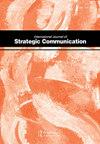Social Media Management, Communication Roles, and Their Effects on Communication practitioners’ Involvement in Strategic Management of Organizations in Greece
IF 1.9
Q1 COMMUNICATION
International Journal of Strategic Communication
Pub Date : 2023-11-09
DOI:10.1080/1553118x.2023.2274597
引用次数: 0
Abstract
ABSTRACTThis article explores how communication management is being practiced in Greece and sheds light on the impact exerted by social media practice and knowledge of communication roles on practitioners’ involvement in organizations’ strategic management process. This article also tests how communication roles interact with the different aspects of social media management. To this end, a quantitative survey was conducted using an online self-administered questionnaire that was completed by 107 communication practitioners in Greece. Communicators in the sample exhibited more knowledge for the technician role and performed managerial tasks to a lesser extent. Greek practitioners are mainly involved in routine operations, but they also perform strategic tasks as they provide input in strategic planning by scanning the environment to identify issues and help management develop goals. Concerning their social media practice, they seem to be involved with tactical activities such as content creation and engagement enhancement. The results also show that social media activities did not influence practitioners’ involvement in strategic management, which was instead affected by the communication roles of manager and technician.KEYWORDS: Communication managementProfessionalizationProfessional rolesStrategic management Disclosure statementNo potential conflict of interest was reported by the author(s).社交媒体管理、沟通角色及其对沟通从业者参与希腊组织战略管理的影响
摘要本文探讨了传播管理在希腊的实践情况,并揭示了社交媒体实践和传播角色知识对从业者参与组织战略管理过程的影响。本文还测试了沟通角色如何与社交媒体管理的不同方面相互作用。为此,一项定量调查使用在线自我管理问卷进行,由107名希腊通信从业人员完成。样本中的沟通者对技术人员角色表现出更多的知识,并在较小程度上执行管理任务。希腊从业者主要参与日常操作,但他们也执行战略任务,因为他们通过扫描环境来识别问题并帮助管理层制定目标,从而为战略规划提供输入。在他们的社交媒体实践中,他们似乎参与了一些战术活动,比如内容创造和增强用户粘性。研究结果还表明,社交媒体活动并不影响从业者对战略管理的参与,而是受到管理者和技术人员沟通角色的影响。关键词:沟通管理专业化专业角色战略管理披露声明作者未报告潜在的利益冲突。
本文章由计算机程序翻译,如有差异,请以英文原文为准。
求助全文
约1分钟内获得全文
求助全文
来源期刊

International Journal of Strategic Communication
Social Sciences-Sociology and Political Science
CiteScore
3.40
自引率
0.00%
发文量
39
期刊介绍:
The International Journal of Strategic Communication examines the philosophical, theoretical, and applied nature of strategic communication, which is “the purposeful use of communication by an organization to fulfill its mission.” IJSC provides a foundation for the study of strategic communication from diverse disciplines, including corporate and managerial communication, organizational communication, public relations, marketing communication, advertising, political and health communication, social marketing, international relations, public diplomacy, and other specialized communication areas. The IJSC is the singular forum for multidisciplinary inquiry of this nature.
 求助内容:
求助内容: 应助结果提醒方式:
应助结果提醒方式:


